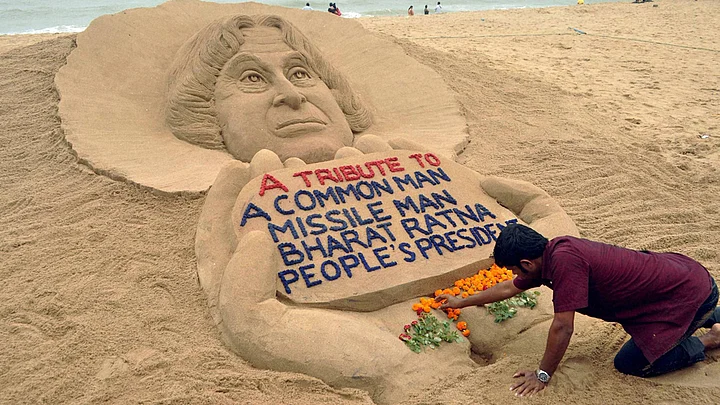A Political President Too
- Kalam though revered as president had a career trajectory marred by certain pitfalls
- Critics accuse Kalam of having a soft corner for the BJP, a party that made him president when it came to power
- He received flak for voicing support in favour of BJP’s demand for Uniform Civil Code
- His visit to Puttaparthi to meet Satya Sai Baba also frowned upon since it was deemed as scientific temper bowing before religion
- Move to go ahead with President’s Rule in 2005 backfired when the decision was quashed by the Supreme Court
“Whatever is profession you do, you should like, whatever job or task you undertake, you should like it...If you have a problem, become the master of the problem and succeed in it,” APJ Abdul Kalam told a group of school students in one of his many interactions with them after demitting office of president.
He apparently liked his job as president and was not averse to a second term, but the political climate had changed after 2007. While the NDA backed him, the UPA, Left and the Shiv Sena, which preferred a Marathi manoos, supported Prathibha Patil’s candidacy, scuttling his chances.
Avul Pakir Jainulbdeen Abdul Kalam is undoubtedly the most revered and acclaimed president India has ever seen. With his apolitical background and profound scientific temperament, the missile-man-turned-president, indubitably, has left a mark on the collective Indian psyche. Nonetheless, he was not without his foibles, as head of state.
His critics accuse him of being soft on the saffron camp. He was critiqued for backing the BJP demand for a Uniform Civil Code. Some felt that as president he tried to usurp executive power.
Support for Pokhran II
While he had an uneasy relationship with the Congress, he got into the good books of the BJP leadership following his support to the Pokhran II tests conducted by the NDA government headed by Atal Bihari Vajpayee, in 1998, a move questioned by prominent nuclear scientists. His erstwhile colleague in the DRDO, K Santhanam, had described the test as a “fizzle”, while H N Sethna, former chairman of the Atomic Energy Commission said Kalam, who was not a nuclear scientist, was not qualified to speak on the subject.
His visit to Puttaparthi to meet Satya Sai Baba was also frowned upon by the left, liberal intelligentsia. An icon of scientific temper was setting a bad example, was the refrain. What got their goat was that the constitutional head was made to sit in a smaller chair while Sai Baba was ensconced in a larger chair next to the president. Apparently, Puttaparthi has no fetish with protocol.
Kalam wanted to set up a cyber link to electronically monitor developmental projects in all districts. Prime Minister Vajpayee, however, shot down the idea which would have created a parallel power centre.
Joint Session of Parliament
The then president had also suggested convening a special joint session of Parliament on the issue of development and expressed his desire to address state assemblies on the same issue, a move Vajpayee politely turned down.
His critics also faulted him for sitting on death row convicts’ mercy petitions. It is believed that he disposed of only one out of 21 requests.
There were also whispers in the corridors of power that Sonia Gandhi proposed Manmohan Singh as PM because Kalam was averse to her swearing-in. The then Janata Party president Subramanian Swamy had written to Kalam requesting him not to appoint Sonia as PM. Kalam denied the insinuation later.
Bihar Fiasco
However, one telling failing that he might have regretted was that of the ill-advised approval of President’s rule in Bihar via fax in the wee hours of May 22-23, 2005, while attending a reception in Moscow.
With no party winning a majority in the Bihar assembly, then governor Buta Singh recommended President’s rule without exploring all options and the UPA government, after a late night cabinet meeting, faxed the recommendation to Kalam who was away in the Russian capital.
The President signed on the dotted line at 1.30 am, but after five months the Supreme Court quashed the “unconstitutional” order much to the embarrassment of Kalam and the UPA government.
Kalam was very upset over the apex court’s decision and contemplated resigning from his post, a fact he confessed in his book ‘A Turning Point: A Journey Through the Challenges.’ He changed his mind when Manmohan Singh counselled him that such a move might trigger unrest in the country.
But Not Pliable
However, within a year, Kalam neutralised the perception of a pliable president by refusing to sign the controversial Office of Profit Bill which had put many leading lawmakers such as Congress president Sonia Gandhi and then Lok Sabha Speaker Somnath Chatterjee in the dock.
After consulting legal experts, he sent the bill back to presiding officers of Lok Sabha and Rajya Sabha instead of the PM, sending jitters in the Congress. He believed that the manner in which exemptions were sought in the bill for certain category of offices was not constitutionally correct. Later, an amended version was passed.
The President earned kudos for using his independent powers. The legal fraternity commended him for fully using presidential powers under Article 111 to take independent decisions. Kalam later recalled that signing this bill was the toughest decision he had taken during his tenure.
(The writer is a Delhi-based senior journalist)
